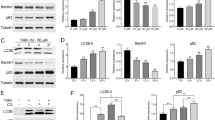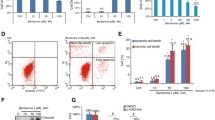Abstract
Autophagy is a cellular degradation process for the clearance of damaged or superfluous proteins and organelles, the recycling of which serves as an alternative energy source during periods of metabolic stress to maintain cell homeostasis and viability. The anti-necrotic function of autophagy is critical for tumorigenesis of many tumor cells, including hepatocellular carcinoma (HCC). However, the underlying mechanism is not clarified yet. Ammonium chloride (NH4Cl) is a well-known autophagy inhibitor, whereas its interaction with SMAD2 signaling pathway has not been reported previously. Here, we show that NH4Cl significantly inhibited rapamycin-induced autophagy in HCC cells through decreasing the levels of Beclin-1, autophagy-related protein 7 (ATG7), p62, and autophagosome marker LC3 and significantly decreased the level of phosphorylated SMAD2 in rapamycin-treated HCC cells. In order to find out whether NH4Cl may inhibit the autophagy in rapamycin-treated HCC cells through inhibition of SMAD2 signaling, we used transforming growth factor β1 (TGFβ1) to induce phosphorylation of SMAD2 in HCC cells. We found that induction of SMAD2 in HCC cells completely abolished the inhibitory effect of NH4Cl on rapamycin-induced autophagy in HCC cells, suggesting that NH4Cl inhibits autophagy of HCC cells through inhibiting SMAD2 signaling.



Similar content being viewed by others
References
Wang L, Yao M, Dong Z, Zhang Y, Yao D. Circulating specific biomarkers in diagnosis of hepatocellular carcinoma and its metastasis monitoring. Tumour Biol. 2014;35:9–20.
Wang H, Chen L. Tumor microenviroment and hepatocellular carcinoma metastasis. J Gastroenterol Hepatol. 2013;28 Suppl 1:43–8.
Han MS, Moon KS, Lee KH, et al. Brain metastasis from hepatocellular carcinoma: the role of surgery as a prognostic factor. BMC Cancer. 2013;13:567.
Wang J, Su H, Han X, Xu K. Inhibition of fibroblast growth factor receptor signaling impairs metastasis of hepatocellular carcinoma. Tumour Biol. doi:10.1007/s13277-014-2384-0.
Green DR, Levine B. To be or not to be? How selective autophagy and cell death govern cell fate. Cell. 2014;157:65–75.
Guo JY, Xia B, White E. Autophagy-mediated tumor promotion. Cell. 2013;155:1216–9.
White E. Deconvoluting the context-dependent role for autophagy in cancer. Nat Rev Cancer. 2012;12:401–10.
Li J, Yang B, Zhou Q, et al. Autophagy promotes hepatocellular carcinoma cell invasion through activation of epithelial-mesenchymal transition. Carcinogenesis. 2013;34:1343–51.
Kiyono K, Suzuki HI, Matsuyama H, et al. Autophagy is activated by TGF-beta and potentiates TGF-beta-mediated growth inhibition in human hepatocellular carcinoma cells. Cancer Res. 2009;69:8844–52.
Massague J. TGFbeta in cancer. Cell. 2008;134:215–30.
Xiao X, Gaffar I, Guo P, et al. M2 macrophages promote beta-cell proliferation by up-regulation of SMAD7. Proc Natl Acad Sci U S A. 2014;111:E1211–20.
Yi JJ, Barnes AP, Hand R, Polleux F, Ehlers MD. TGF-beta signaling specifies axons during brain development. Cell. 2010;142:144–57.
Ewen ME, Sluss HK, Whitehouse LL, Livingston DM. TGF beta inhibition of Cdk4 synthesis is linked to cell cycle arrest. Cell. 1993;74:1009–20.
Naka K, Hoshii T, Muraguchi T, et al. TGF-beta-FOXO signalling maintains leukaemia-initiating cells in chronic myeloid leukaemia. Nature. 2010;463:676–80.
Xiao X, Wiersch J, El-Gohary Y, et al. TGFbeta receptor signaling is essential for inflammation-induced but not beta-cell workload-induced beta-cell proliferation. Diabetes. 2013;62:1217–26.
Huang S, Liao Q, Li L, Xin D. PTTG1 inhibits SMAD3 in prostate cancer cells to promote their proliferation. Tumour Biol. 2014;35:6265–70.
Amiel E, Everts B, Freitas TC, et al. Inhibition of mechanistic target of rapamycin promotes dendritic cell activation and enhances therapeutic autologous vaccination in mice. J Immunol. 2012;189:2151–8.
Acknowledgments
This work was supported by the Young Foundation of The First Affiliated Hospital of Zhengzhou University.
Author information
Authors and Affiliations
Corresponding author
Additional information
Ranran Sun and Yonggang Luo have equal contribution.
Rights and permissions
About this article
Cite this article
Sun, R., Luo, Y., Li, J. et al. Ammonium chloride inhibits autophagy of hepatocellular carcinoma cells through SMAD2 signaling. Tumor Biol. 36, 1173–1177 (2015). https://doi.org/10.1007/s13277-014-2699-x
Received:
Accepted:
Published:
Issue Date:
DOI: https://doi.org/10.1007/s13277-014-2699-x




